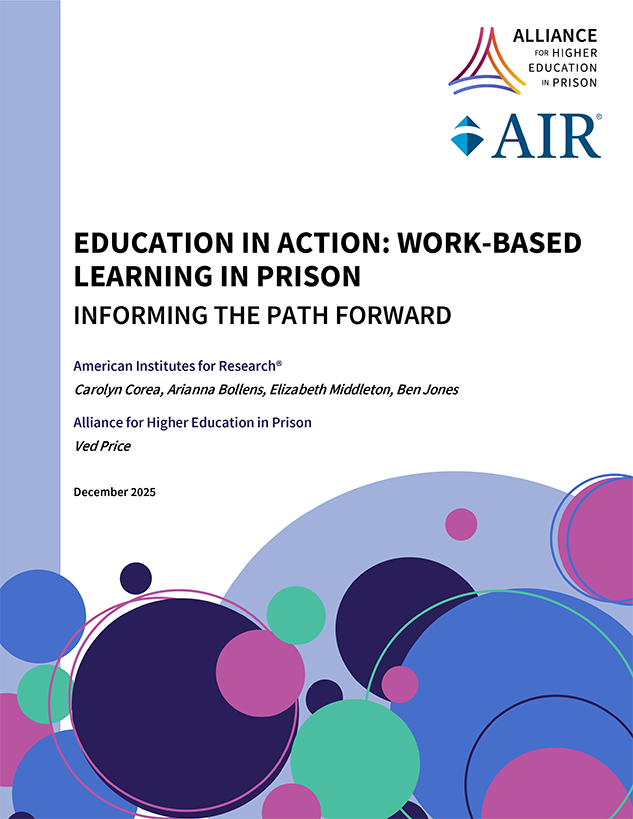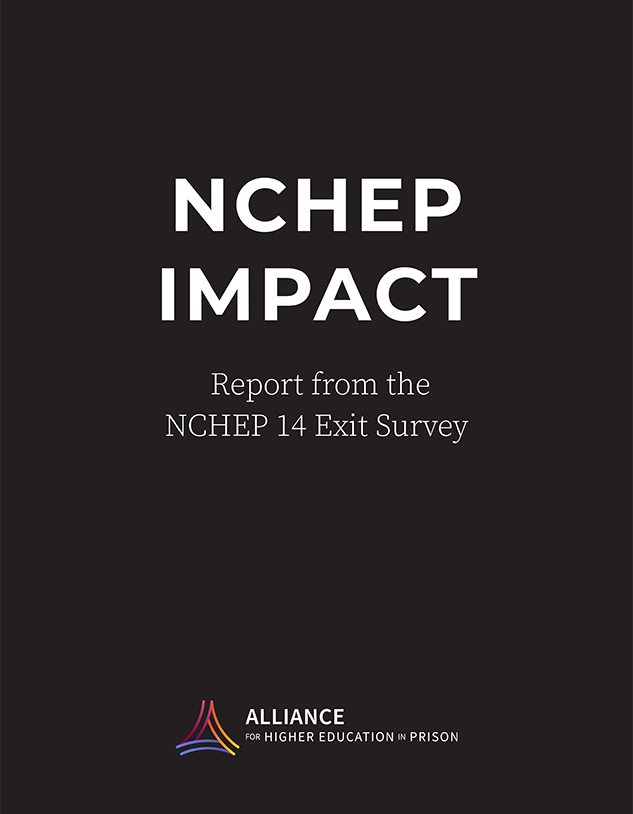


We are committed to supporting the field of higher education in prison by advocating for open-access to the resources, tools and training necessary for programs and individuals to succeed.
Through the lens of equity and quality, the Alliance seeks to collect data and publish research about the expanding field of higher education in prison. By acting as an information-sharing network, and providing open-access resources about higher education in prison programs, the Alliance aims to improve student access to in-prison and post-incarceration educational opportunities.


This report, completed in partnership between the American Institutes of Research and the Alliance for Higher Education, presents the findings of an exploratory study and national scan of state laws, policies, and practices related to work-based learning (WBL) in prisons. It identifies cross-cutting themes, gaps in policy and practice, and recommendations for strengthening WBL across prison settings.


This document is the result of a comprehensive strategic planning process, generously funded by Ascendium Education Group with additional support from the Mellon Foundation, and led by Jasmine Nielsen and Maya Meredith of Julep Consulting. It reflects extensive stakeholder engagement and sets a roadmap for our work to advance higher education in prison and through reentry.


Building on years of growth, NCHEP 14 showcased what a justice-aligned, data-informed, community-centered convening can look like. It was a nexus for policy, practice, and power sharing. This year’s intentional evaluation of NCHEP confirmed what many have long believed: NCHEP is a catalyst for tangible change. As the conference approaches its 15th year, the Alliance remains focused on evolving NCHEP to meet the field’s needs: uplifting directly impacted voices, broadening access, and fostering visionary conversations about the path ahead.


This resource offers corrections officials, higher education administrators, potential employers, and aspiring incarcerated student–professionals with clear and concrete guidance for exploring and implementing Education in Action (EiA). EiA is any meaningful professional or WBL opportunity that allows incarcerated students to apply the knowledge, skills, and abilities gained through HEP. Remote work positions are ideal for EiA, although in-person options can be successful in places where internet and technology access do not allow for remote employment. Although HEP programming already benefits both facility and community safety, there is a need for more professional avenues where students can apply their education in workplace settings. EiA seeks to fill this need by linking HEP programs to professional experiences and success in the community as a logical next step.


This practice brief provides six recommendations for college and university staff to create or update data collection and reporting capacities for students with incarceration histories. These recommendations were derived from a national study that examined if and how colleges and universities collect and report information on students with incarceration histories. At present, the Integrated Postsecondary Education Data System (IPEDS) does not require institutions to report student data with an incarceration indicator. This means that national enrollment, completion, time-to-credential, and related success metrics for incarcerated students are unknown in the aggregate. Consequently, the rapid growth of enrollment among students with incarceration histories is happening without a baseline understanding of who students are, where they are located, what programs of study they are pursuing, and how they are faring in those pathways. The practice brief aims to assist college and university staff in taking stock of current data collection and reporting practices and initiating intentional processes of incorporating this population of students into critical data infrastructure.
_Page_01.png)
_Page_01.png)
This research brief offers insight into how college and university presidents of institutions with prison higher education programs talk about and explain providing postsecondary education to incarcerated learners. Against the backdrop of recent federal policy changes alongside the magnitude in program growth, we seek to document and understand how college and university presidents talk about prison higher education. Additionally, the recent expansion of Pell Grant eligibility for incarcerated students (see: FAFSA Simplification Act, 2019) alongside unprecedented speed in program growth, draws further importance to understanding how campus presidents articulate the reasons for prison higher education, as a way to inform future access to postsecondary education for incarcerated people as well as provide insight into the perceived relationship between the goals of higher education and prison higher education.


The Landscape of Higher Education in Prison reports provide a descriptive overview of the field of higher education in prison during the 2018-2019, 2019-2020, and 2020-2021 academic years. The data reported here is collected from the Annual Survey of Higher Education in Prison Programs and is made public through the National Directory of Higher Education in Prison Programs.


Established in 2019, the Journal of Higher Education in Prison is the only open-access, peer-reviewed journal that publishes exclusively on topics and issues affecting the field of higher education in prison.


The Resource Community for Higher Education in Prison (RCHEP) is an interactive platform where practitioners, students, graduates, advocates, administrators, and anyone invested in HEP can gather to share program updates, news, and resources, while also initiating and engaging in community building group discussions and blogs.


This brief report from the Higher Education in Prison Landscape Project outlines the potential impacts of Pell restoration on the field of higher education in prison. Using original qualitative data from interviews with 12 higher education in prison programs and quantitative data from the 2020 Understanding the Landscape of Higher Education in Prison national survey, the analysis focuses on persistent funding challenges that the Pell grant alone cannot address.